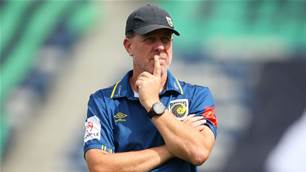FOOTBALL Association chairman Lord Triesman insists there is "life in the corpse" of goalline technology.
Developments of goalline systems were declared "dead in the water" by the FA a year ago after football's rulemakers shelved any further experiments.
The International FA Board however this weekend gave permission for one of the companies involved to present their latest findings again later this year.
Triesman said after the meeting near Belfast: "There may be some signs of life in the corpse. People have not closed their minds to it as much as I feared they had a year ago.
"There's no doubt in my mind that if a really robust technical version of goalline technology came to fruition there would be support for it.
"I still think it has got merit and I don't think the issue is closed off completely at all.
"People are talking about whether the technologies have moved on and improved and you wouldn't ask that if you had no interest in the technology being available."
The microchip-in-a-ball system being developed by Adidas and German firm Cairos Technology is the one where worked has continued.
The Premier League had championed a rival being developed by Hawkeye, and they will now decide whether to revive work on that system.
Meanwhile, the IFAB have given the green light to further trials of UEFA president Michel Platini's alternative to technology: an extra assistant referee behind each goalline.
The Italian Cup will be the first guinea pig and the French FA have also offered to trial the scheme, while the USA's Major League Soccer is also a possibility.
Platini is convinced the system will be operational in football for Euro 2012 and said the Championship in England could also be a possible league for an experiment.
Asked if he was confident it would become part of football's rules, Platini said: "I am sure."
He added: "The decision will be made in 2011 so if it is agreed then it will be used in Euro 2012.
"First we have to study it in a top league with atmosphere and television cameras.
"It could be something like the Championship in England, that could be a good idea."
Platini said unlike goalline technology, the extra assistants could also help the referee on decisions such as penalties and handballs.
The UEFA president added: "I am still against a video referee. If you have an additional referee he can see if the ball is in the goal. You don't need another system.
"On TV, they show the mistakes of referees and we have to help them."
The IFAB also rejected a proposal by the Irish FA for sin-bins, and by the Scottish FA for a fourth substitute to be allowed in extra time.
Meanwhile, FIFA abandoned their controversial proposal to extend the half-time break from 15 to 20 minutes after opposition from the home nations.
Triesman said: "We did a lot of polling of supporters because what they feel about an issue like the half-time break is absolutely central to how we take the decision.
"It didn't matter what level or whether it was a man or a woman, there was not really anyone in favour of if apart from a small handful."
The IFAB is made up of representatives of the four home associations, who each have a vote, and FIFA, who have four. Any rule change needs at least six votes in favour.
Related Articles

Champion A-League coach set to join Premier League giants

Emerging Socceroos star set to sign for MLS club













